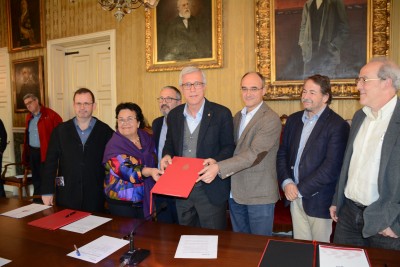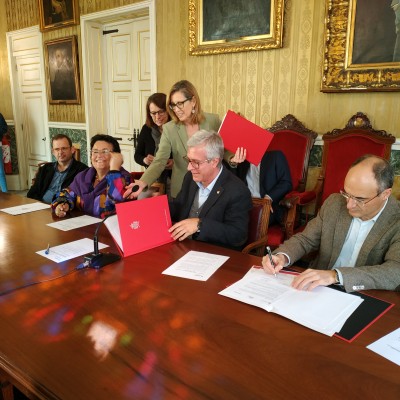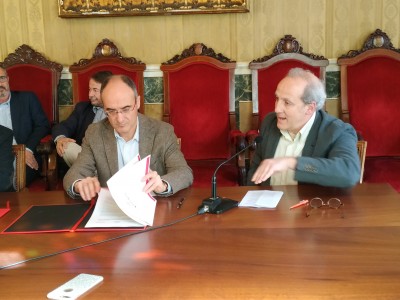
The agreement between Ematsa, ICAC and the URV includes the elaboration of a Strategic Plan for the protection, study and dissemination of the historical heritage linked to the collection and transport of water to the municipalities of Tarragona, La Canonja, El Catllar and Els Pallaresos.
The Tarragona Water Board (Ematsa), the Catalan Institute of Classical Archeology (ICAC) and the Universitat Rovira i Virgili (URV) have signed a collaboration agreement aiming the promotion of dissemination projects in the field of classical archeology and historical heritage, all linked to the water collection in the municipalities of Tarragona, La Canonja, El Catllar and Els Pallaresos.
“The ICAC will provide its technical and academic competence to enforce architectural, cultural and social contents linked to the history of the water cycle in Tarragona, La Canonja, El Catllar and Els Pallaresos. The purpose of this agreement is to protect, study and disseminate our heritage”, underlines the Mayor of Tarragona and EMATSA president, Josep Fèlix Ballesteros.

The results of the collaboration will make possible the development of new activities for the dissemination of heritage and the value of water as a resource, with a historical perspective that highlights its decisive importance in the urban, cultural and social construction of territories and communities. The dissemination activities will serve to promote the culture of the management of the water cycle and will be included in the socio-cultural agenda of the city, in order to increase awareness among the citizens.
The rector of the Rovira i Virgili University, Maria José Figueras, stressed the importance “of an agreement that consolidates the relationship between the City Council, the University and Ematsa. This agreement adds value to the great good that is water. It is important to disseminate research on the collection and distribution of this resource”. And she concluded: “We want to strengthen our role as a promoter of the values of our heritage”.
The director of the ICAC, Josep Maria Palet, defended that “the study of the management of the water is a prior and current research topic. Water collection and distribution are public works that imply the whole territory and different municipalities, for which they have a multiscale involvement”. And he added: “It also enhances unknown heritage elements which can have an impact on attracting cultural tourism”. An idea that has also been pointed out by the director of the School of Architecture of the URV, Pau de Solà-Morales: “We will elaborate a strategic plan to know the heritage we have since it is the best way to disseminate it”.

The first action to implement is, precisely, the development of a Strategic Plan for the protection, study and dissemination of the Historical Heritage linked to the water collection and distribution in the municipalities of Tarragona, La Canonja, El Catllar and Els Pallaresos. This strategic plan will create a catalogue of the heritage elements related to the water cycle in the mentioned municipalities. It will also include a proposal for dissemination and/or museum-oriented projects, aiming to establish future priorities for managing the water heritage in the affected municipalities.





